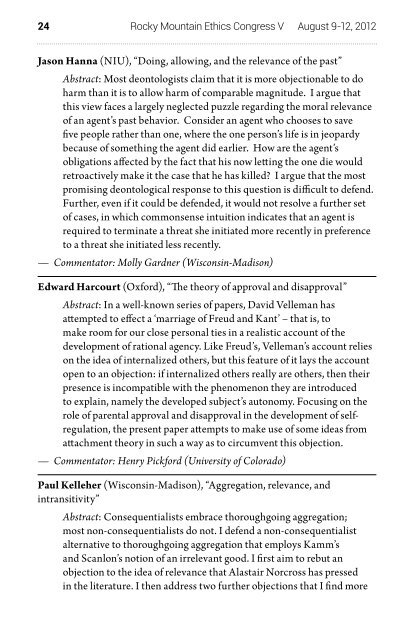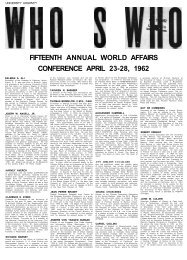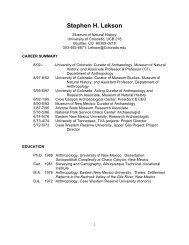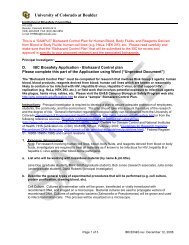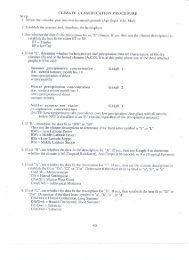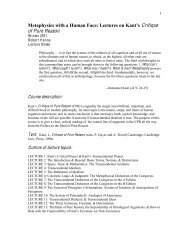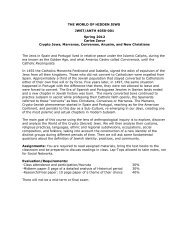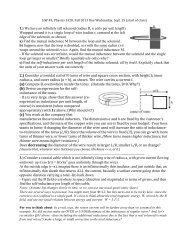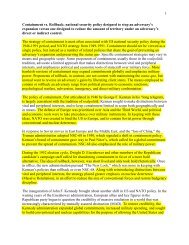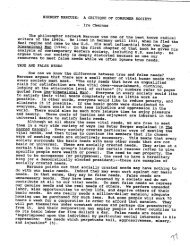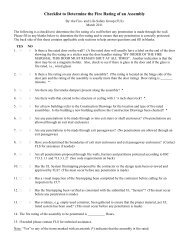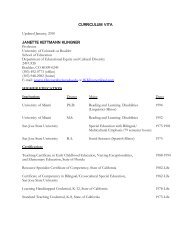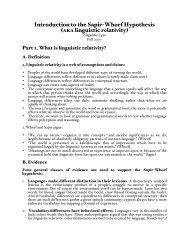Acknowledgementsl - University of Colorado Boulder
Acknowledgementsl - University of Colorado Boulder
Acknowledgementsl - University of Colorado Boulder
Create successful ePaper yourself
Turn your PDF publications into a flip-book with our unique Google optimized e-Paper software.
24 Rocky Mountain Ethics Congress V August 9-12, 2012<br />
Jason Hanna (NIU), “Doing, allowing, and the relevance <strong>of</strong> the past”<br />
Abstract: Most deontologists claim that it is more objectionable to do<br />
harm than it is to allow harm <strong>of</strong> comparable magnitude. I argue that<br />
this view faces a largely neglected puzzle regarding the moral relevance<br />
<strong>of</strong> an agent’s past behavior. Consider an agent who chooses to save<br />
five people rather than one, where the one person’s life is in jeopardy<br />
because <strong>of</strong> something the agent did earlier. How are the agent’s<br />
obligations affected by the fact that his now letting the one die would<br />
retroactively make it the case that he has killed? I argue that the most<br />
promising deontological response to this question is difficult to defend.<br />
Further, even if it could be defended, it would not resolve a further set<br />
<strong>of</strong> cases, in which commonsense intuition indicates that an agent is<br />
required to terminate a threat she initiated more recently in preference<br />
to a threat she initiated less recently.<br />
— Commentator: Molly Gardner (Wisconsin-Madison)<br />
Edward Harcourt (Oxford), “The theory <strong>of</strong> approval and disapproval”<br />
Abstract: In a well-known series <strong>of</strong> papers, David Velleman has<br />
attempted to effect a ‘marriage <strong>of</strong> Freud and Kant’ – that is, to<br />
make room for our close personal ties in a realistic account <strong>of</strong> the<br />
development <strong>of</strong> rational agency. Like Freud’s, Velleman’s account relies<br />
on the idea <strong>of</strong> internalized others, but this feature <strong>of</strong> it lays the account<br />
open to an objection: if internalized others really are others, then their<br />
presence is incompatible with the phenomenon they are introduced<br />
to explain, namely the developed subject’s autonomy. Focusing on the<br />
role <strong>of</strong> parental approval and disapproval in the development <strong>of</strong> selfregulation,<br />
the present paper attempts to make use <strong>of</strong> some ideas from<br />
attachment theory in such a way as to circumvent this objection.<br />
— Commentator: Henry Pickford (<strong>University</strong> <strong>of</strong> <strong>Colorado</strong>)<br />
Paul Kelleher (Wisconsin-Madison), “Aggregation, relevance, and<br />
intransitivity”<br />
Abstract: Consequentialists embrace thoroughgoing aggregation;<br />
most non-consequentialists do not. I defend a non-consequentialist<br />
alternative to thoroughgoing aggregation that employs Kamm’s<br />
and Scanlon’s notion <strong>of</strong> an irrelevant good. I first aim to rebut an<br />
objection to the idea <strong>of</strong> relevance that Alastair Norcross has pressed<br />
in the literature. I then address two further objections that I find more


